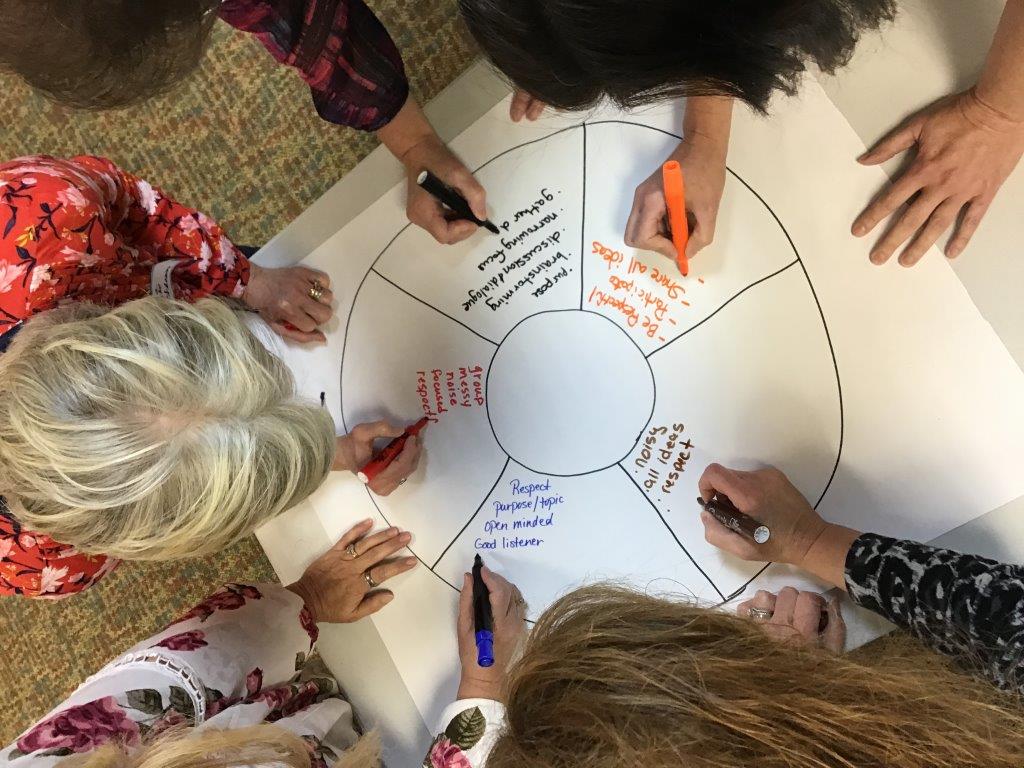TRANSFORMATIONAL LEADERSHIP
COLLABORATIVE PROCESSES
WHY IS THIS CRITICAL?
Transformational leadership supports a culture of collaboration throughout the school and at all levels. In particular, developing a culture of professional learning through inquiry and exploration is a process that includes an intentional focus on building the capacity of teams to collaborate effectively. Fostering a culture of teamwork and collaboration among stakeholders establishes a commitment to continuous improvement and shared responsibility for student learning outcomes. Collaboration harnesses the power and talents of many to address the urgent needs of student learners.
HOW MIGHT INVOLVING ALL STAKEHOLDERS IN MEANINGFUL AND PURPOSEFUL CONVERSATIONS IMPACT STUDENT LEARNING?

Self-reflection Guide
-
FOUNDATIONAL
HRSC The collaborative process begins to include guidance and input from the community to drive innovation and learning. The importance of partnerships with community organizations and businesses begins to emerge as stakeholders engage in collaborative conversations centered on improved outcomes for learners. Classroom doors begin to open to peers, parents, and community, and professional discourse emerges in the workplace. Student, parent, staff, and community voices are valued and emerge as a driving force behind the learning culture in the school. HRSC Classrooms begin to reflect this mindset by including opportunities for learners to share responsibility for learning and demonstrate their learning through projects that enhance communication, collaboration, and critical thinking skills.
-
DEVELOPING
HRSC Protocols emerge as tools to help structure and accomplish collaborative work. Protocols are structured processes a group uses to increase the likelihood that meaningful conversations can occur and result in increased ownership in the learning process. Trust and respect develop as a result of open communication and collaboration among students, staff ,and community. An emphasis on the value of collaborative work and the time it takes to do this work effectively emerges and is evident in the flexibility of routines and schedules to accommodate it. Classrooms become more learner-centered as teachers and students collaboratively design the learning. The use of inquiry to engage in learning and solve problems throughout the school is a shared undertaking.
-
SUSTAINING
The school has a system in place for collaborative work involving diverse stakeholders. The routine use of protocols ensures each voice is able to contribute and a prevailing atmosphere of collegiality, trust, and respect enables stakeholders to participate in the transformative work for learning. Community /school partnerships guide and direct learning initiatives. HRSC Time for collaboration during school hours, where teachers share their own work, observe one another's practice, and provide constructive feedback is the motor that drives learning forward. All teachers and students are involved in consistent group-based conversations that are well- established, organized, skillfully facilitated and focused on learning outcomes. Collaborative teams foster an environment where stakeholders are encouraged to engage in inquiry to solve problems and to try new approaches while in a safe, collaborative environment.
What might I consider?
- How might collaboration among teachers have a positive impact on learner outcomes?
- What might be the impact of collaborative learning on quality and depth of learning?
- How might including more staff, district personnel, students, parents, and community in impact the design for innovation?
Where might I start?
Engage your team in a self-reflection on the critical attribute: Collaborative Processes.
Explore Collaborative Processes Transformational LeadershipUsed with permission. From Handbook for High Reliability Schools™: The Next Step in School Reform by Robert J. Marzano, Philip B. Warrick, and Julia A. Simms. Copyright 2014 by Marzano Research, 555 North Morton Street, Bloomington, IN 47404, 800.733.6786, www.marzanoresearch.com
